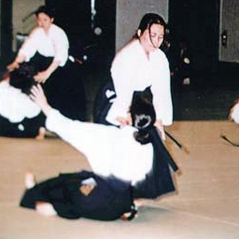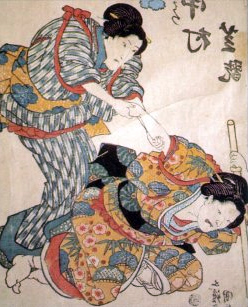|
Budo from a Women's Point of View
|
Fujiyama Dojo P.O. Box 20003 Thorold, ON, Canada L2V 5B3 (905) 680-6389 |
|---|
 What will not woman, gentle woman, dare What will not woman, gentle woman, dareWhen strong affection stirs her spirit up? - R. Southey By reading some of Yamamoto-sensei's mail, I have become acquainted with some strange ideas that people have about female budoka, as well as some peculiar notions that women budoka have about themselves and life in general. Although Yamamoto-sensei and I do not attend classes at the same dojo, we are classmates at English Language training and have many ideas in common. In some areas we disagree, but regardless of our differences, she has been kind enough to ask me to address the issues in these letters and in so doing freely express my personal views in the hope that they will be of some help to those who wrote the letters. One aspect in which Yamamoto-sensei and I differ is in respect to traditions, or rather the influence that frequent family contact and the environment in which we live have in the keeping of martial traditions. Her views support the idea that strong family ties, frequent contacts and preservation of family traditions, as defined by old Japanese ways, are the only things capable of sustaining the spirit of a Japanese woman budoka living abroad. I do not disagree with the fact that direct contact is a strong influence, but I also take into consideration that my father's older sister traveled overseas in 1931, ended up in Western Canada where she married a Dutchman, lived in a remote area, bore three daughters, and never lost sight of who she was. All through her life, which in many respects was far from easy, she kept not only her traditions but also all the techniques she could remember of the ones she learned in her youth while living at the Hanzawa household, some of which she taught her oldest daughter. She was certainly not able to recall everything she learned, but I do not consider that the knowledge she lost takes away from the fact that she did not stray from her path. Her own spirit was her best guide. The letter I am referring to here claims that she (the writer) has been unable to find dedicated Budo students of her own gender. She complains that most young female budoka she has met take Budo very lightly, as a pastime of sorts, and gladly disregard everything that is not purely the physical side of training, having no qualms about quitting whenever conditions aren't convenient. She adds that a few of these young ladies are Japanese born, or of Japanese ancestry, but Americans are no different, and so she finds herself isolated. Frankly, although I understand her concern, I can add to her comments that she will find the same attitudes in men and women in Tokyo, or Osaka, or Saitama ... and mostly everywhere, because true serious commitment is as hard to find today as the tsuki no wa guma (moon bear) will be in a few years if the stupid poaching doesn't stop. Lack of serious commitment springs from human indifference, which is a vice of human character created by a weak spirit. The problem has nothing to do with either gender or nationality. Just as in my aunt's case, where her spirit was her strength (she could have decided to learn to churn butter and find pride of identity in that skill; it would have been much easier for her); for the people described in this letter, the flaw is in their spirit, and so there also lies the solution, but it all begins with the will of the individual, a trait of the character that is formed at an early age. The success of the journey depends greatly on how we have been taught to take our first steps, because that will determine how receptive we will be to guidance later on. A good Budo teacher can offer good advice, but we have to be able to hear if we are to profit from it.  Family traditions have to contend with all the tendencies, fads and vices around us, but we can fend them off with the strength of our own spirit, and be as comfortable and as secure with them as we would in our home dojo.
So, for a young Japanese budoka living abroad, unable to call home every Friday, isolation may be uncomfortable, but not a real threat to her Budo, or to her character. It will in fact make her stronger.
Our recommendation is: train hard, and safeguard your principles. Do not compromise. As long as you keep in touch with who you are, who you want to be, and remain true to yourself, you can be immovable as a mountain. No one can take that away from you, unless you allow it.
One final note: We would love to hear from other female budoka out there who might have questions, views to share or just say hello. Until our next installment, have a happy tsukimi (moon-viewing party). Family traditions have to contend with all the tendencies, fads and vices around us, but we can fend them off with the strength of our own spirit, and be as comfortable and as secure with them as we would in our home dojo.
So, for a young Japanese budoka living abroad, unable to call home every Friday, isolation may be uncomfortable, but not a real threat to her Budo, or to her character. It will in fact make her stronger.
Our recommendation is: train hard, and safeguard your principles. Do not compromise. As long as you keep in touch with who you are, who you want to be, and remain true to yourself, you can be immovable as a mountain. No one can take that away from you, unless you allow it.
One final note: We would love to hear from other female budoka out there who might have questions, views to share or just say hello. Until our next installment, have a happy tsukimi (moon-viewing party).
|
|---|


